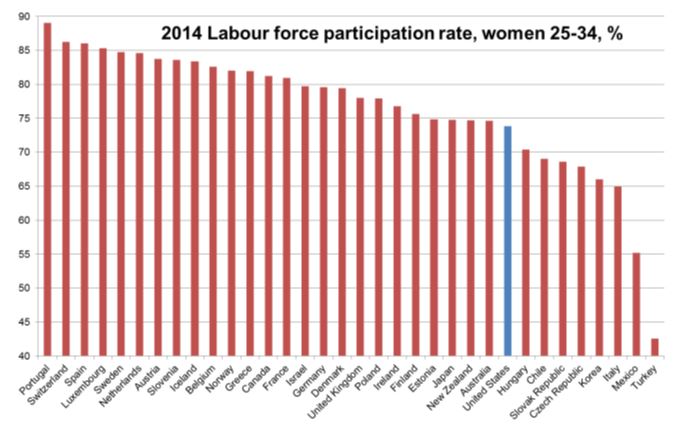
The first four months of the Trump Administration has given us much to disagree with. The list is a long one but for many is likely to include the travel bans barring people from Muslim-majority countries, moves to repeal the Affordable Care Act, and key planks of the 2018 federal budget proposals released earlier this week.
But there is one surprising proposal in all this that I find myself in the unusual position of supporting, and that’s the Administration’s call, apparently driven by Ivanka Trump, for the introduction of six weeks of publicly-funded paid parental leave.
The US is the only developed country in the world without some form of guaranteed paid parental leave. Even in the developing world there are only three countries – Papua New Guinea, Tonga and Guyana – without some form of paid maternity leave. This matters for lots of reasons.
For one, the US has one of the lowest rates of labour force participation among women of prime childbearing age in the OECD. See chart below. That’s a lot of unused potential that could be increasing family incomes and driving up economic growth.

In general, the countries with higher maternal participation rates tend to be those where parents have access to well-developed paid parental leave schemes complemented with extensive, affordable childcare. Of course this association does not prove a causal relationship from one to the other, but there’s a growing body of evidence from parental leave reforms across the world, including in California which introduced its own modest paid parental leave scheme in 2004 in the absence of a federal scheme, that access to paid parental leave does lead to increased labour supply among mothers of young children, particularly among more disadvantaged mothers who are the least likely to be covered by employer-funded schemes and the least likely to be able to afford to take unpaid leave in the absence of a paid leave scheme.
Paid parental leave also impacts positively on health for both mother and baby, for example by extending breastfeeding and allowing more recovery time among mothers who would otherwise have to return to work sooner. For compelling accounts of the experiences of mothers in the US who had to return to work within a few weeks of giving birth see this presentation from Jessica Shortall:
Further, by increasing the proportion of mothers who are able to take a period of paid leave but stay with their existing employer and in their existing job (and thereby retain more of the job-specific and firm-specific skills that might otherwise be lost), and by enabling or arguably better still mandating fathers to spend more time at home with their children in those vital early weeks when emotional bonds and parenting patterns set in, paid parental leave has a role to play in tackling gender imbalances in the labour market and beyond.
Of course the devil is in the detail here, or lack of detail, as pointed out by Alexia Campbell. We don’t know what the level of payments would be. We don’t really know how it would be funded, other than that states might be asked to come up with most of the funding through their unemployment insurance programs (unlikely to go down well with Republicans in Congress).
Neither do we know how much political capital the Trump Administration is willing or able to spend to try to get this written into law. What we do know is that employers would be required to offer six weeks of paid leave to new mothers and fathers after the birth or adoption of a child instead of none. This would still leave the US with the least generous paid parental leave scheme in the OECD in terms of duration and it falls well short of the FAMILY Act repeatedly proposed by the Democrats in Congress.
But it would be a start. And the fact that there are now powerful voices on both sides of the political divide in the US calling for the introduction of publicly-funded paid parental leave suggests there may yet be light at the end of this particular tunnel.
The featured image has been used courtesy of a Creative Commons licence.
